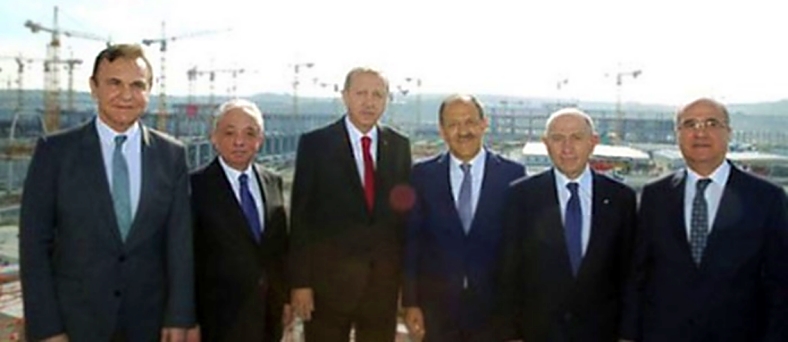Levent Kenez/Stockholm
Turkey stipulates that companies close to Turkish President Recep Tayyip Erdoğan are to be given priority in Turkish-supported infrastructure investments in foreign countries, a document obtained by Nordic Monitor shows.
According to the “Agreement between Turkey and Bosnia and Herzegovina on Cooperation in Infrastructure and Construction Projects” signed in Ankara on March 16, which was recently sent to parliament for approval by President Erdoğan, Turkey commits to supporting the construction of highways for several routes in Bosnia that constitute parts of the Belgrade-Sarajevo highway project, the construction of which was started earlier. The agreement states that priority in the selection of contractors will be given to contractors that are currently working on the routes specified. This condition, which seems quite reasonable for practical reasons at first glance, actually contains fine detail. A quick look indicates that there is only one Turkish company that meets that condition; moreover, it belongs to a businessman who is in President Erdoğan’s inner circle. Following the signing of the agreement, the Turkish and Bosnian media not surprisingly reported that Taşyapı would do the construction and that it had already completed feasibility and survey studies long before.
The owner of Taşyapı, Emrullah Turanlı, is believed to be one of Erdoğan’s closest associates. Turanlı, who is from Erdoğan’s hometown of Rize, an important criteria for securing tenders in Turkey at the moment, was the person whom Erdoğan reportedly instructed his ministers to assist, according to wiretaps which came to light as part of a corruption scandal that shook the government at the end of 2013.

Taşyapı grew by winning highly controversial housing tenders in Turkey, and the Erdoğan government paved the way for infrastructure projects abroad. The company has already completed lucrative projects in Kazakhstan, the United Arab Emirates and Cyprus.
The project that Turkey will support actually is the Bosnian stretch of the Sarajevo-to-Belgrade highway. The first phase of the project, which is expected to cost 2 billion euros, started in 2019 in Serbia, with Erdoğan participating in the groundbreaking ceremony.
It has not yet been made clear how the Bosnian stretch of the highway will be funded, although Turkey has suggested that it will provide the money. The agreement between Turkey and Bosnia offers the possibility of financing through Turkish banks or international banking institutions.
“Finances are still being discussed, it is necessary to make estimates. I expect that Mr. Erdogan will grant a more favorable loan to Bosnia than to Serbia,” Milorad Dodik, the Serb member of the Bosnian presidency, told a press conference after the signing ceremony.
This is not the first time that Erdoğan’s favors for businesspeople close to him have come up. Nordic Monitor earlier published that Sedat Peker, a convicted gang leader and former ally of Erdoğan, claimed that former Libyan prime minister Fayez al-Sarraj resigned after he was caught in the middle between Erdoğan’s demands and those of Libyan businessmen who had supported him during the country’s turbulent civil war.
“I met a Turkish minister whom I will not name. He told me our president had asked [Sarraj] to award these tenders to these [Turkish] companies. The man then resigned. Everybody asked why. I only learned the reason after this minister told me. The man [Sarraj] resigned after his financial supporters asked what they were to do [if all those tenders were awarded to Turkey],” Peker said in a YouTube video that was viewed by more than 14 million people.
Likewise, the Albayrak Group, a Turkish conglomerate accused of corrupt practices in Turkey and abroad, is involved in major construction projects particularly in Somalia and other African countries with Erdoğan’s help. The Albayrak companies have won many large public tenders ranging from construction of the Istanbul metro to producing tanks for the Turkish army, many of which were the subject of controversy and investigations of corruption. The management of the Mogadishu harbor facilities was handed over to the Albayrak Group at Erdoğan’s request. In 2019 the awarding to Albayrak by Guinean President Alpha Condé, a good friend of Erdoğan, of the concession for the Autonomous Port of Conakry (PAC) without following the proper procedures sparked a backlash.

It is no secret that Erdogan wields great financial power by awarding tenders to businessmen close to him. At the forefront of these businessmen are the contractors referred to as the “Gang of Five.”
Those businessmen are Cengiz Holding Chair Mehmet Cengiz; Limak Holding CEO Nihat Özdemir; MNG Holding Chairman Mehmet Nazif Günal; Kolin Construction CEO Naci Koloğlu; and Kalyon Construction Chair Cemal Kalyoncu.
According to World Bank data, those five firms in Turkey are among the world’s top 10 private sponsors of public infrastructure projects by investment and region and by investment and primary sector for the years 1990 to 2020. The companies have won tenders valued at $30 billion for infrastructure projects in the last four years. This figure constitutes 30 percent of all tenders held for government projects. The rest of the public tenders have been shared among 20,851 companies.
The Turkish Trade Ministry granted 128 permits for special tax exemptions to these five construction companies in the span of 10 years, a written answer to a parliamentary question posed by an opposition lawmaker last year revealed.












